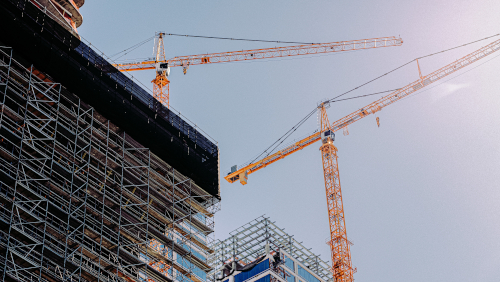Table of Contents[Hide][Show]
When embarking on a construction project, whether you’re the project owner or the contractor, there’s a critical financial tool you should be aware of: contract surety bonds. These bonds play a pivotal role in ensuring that construction projects are executed smoothly, on time, and within budget. In this comprehensive guide, we’ll delve into the world of contract surety bonds, exploring what they are, their different types, and why they matter.
If you already know what you need, click to Get a Quick, Easy Quote for your surety bond.

What Are Contract Surety Bonds?
Contract surety bonds are financial guarantees that help protect the interests of various parties involved in construction projects. They are typically used in the construction industry to ensure that projects are completed as per the agreed-upon terms and conditions. These bonds act as safety nets, offering financial security in case things don’t go as planned.
Parties Involved
- Principal: This is the contractor or construction company responsible for fulfilling the terms of the contract.
- Obligee: The obligee is usually the project owner or investor who requires the contractor to obtain a bond. They are the beneficiaries of the bond and can file claims if the contractor fails to meet their obligations.
- Surety: The surety is the entity that issues the bond. Typically, this is an insurance company or a specialized surety bonding company. The surety steps in to ensure that the principal’s obligations are met.
Types of Contract Surety Bonds
Contract surety bonds come in various types, each serving a specific purpose in construction projects. The three primary types of contract surety bonds are bid bonds, performance bonds, and payment bonds.
1. Bid Bonds
Before a construction project officially begins, contractors must submit bids outlining the cost and scope of their work. A bid bond is a preliminary bond that accompanies the bid submission. Here’s how it works:
- Purpose: Bid bonds provide assurance to project owners that the contractor is serious about the project and will enter into the contract if awarded.
- Protection for Obligees: If the winning bidder refuses to enter the contract or cannot meet the required performance and payment bonds, the obligee can make a claim against the bid bond. This helps protect the obligee from financial loss and delays in the project.
- Cost: Bid bonds are typically issued for a small percentage of the bid amount (usually around 5-10%). The actual cost depends on factors like the project’s size and complexity and the contractor’s financial stability.
2. Performance Bonds
Performance bonds are a fundamental component of most construction projects. They provide a safety net for the project owner by ensuring that the contractor fulfills their obligations as outlined in the contract. Key points about performance bonds include:
- Purpose: Performance bonds guarantee that the contractor will complete the project according to the terms and conditions specified in the contract. They provide financial protection to the obligee against potential project abandonment or subpar work.
- Claims: If the contractor fails to meet their obligations, the obligee can make a claim against the performance bond. The surety will then investigate the claim and may step in to complete the project or compensate the obligee.
- Cost: The cost of a performance bond varies based on factors like the bond amount and the contractor’s financial stability. It typically ranges from 1% to 3% of the contract amount.
3. Payment Bonds
Payment bonds are crucial for ensuring that subcontractors, suppliers, and laborers involved in the project are paid for their work. These bonds serve as a protection mechanism for those who provide goods and services to the contractor. Here’s what you need to know about payment bonds:
- Purpose: Payment bonds guarantee that the contractor will pay all subcontractors, suppliers, and laborers involved in the project. This ensures that everyone down the chain receives proper compensation, reducing the risk of liens and disputes.
- Claims: If a party involved in the project does not receive payment, they can make a claim against the payment bond. The surety will investigate the claim and, if valid, provide compensation to the claimant.
- Cost: Similar to performance bonds, the cost of payment bonds depends on factors like the bond amount and the contractor’s financial stability. It typically ranges from 1% to 3% of the contract amount.
Benefits of Contract Surety Bonds
Now that you have a clear understanding of the types of contract surety bonds let’s explore the benefits they offer to various parties involved in a construction project:
1. Protection for Project Owners
- Financial Security: Contract surety bonds provide project owners with financial security. If the contractor defaults on the project, the obligee can make a claim on the bond to cover the costs of completing the work.
- Quality Assurance: Performance bonds incentivize contractors to complete the project according to the agreed-upon quality standards and within the specified timeframe.
2. Attracting Reputable Contractors
- Bidding Confidence: Bid bonds give project owners confidence that the contractors bidding on their projects are financially capable and committed to completing the work.
- Risk Mitigation: The presence of bid bonds helps weed out contractors who may not have the financial stability to complete the project, reducing the risk of project abandonment.
3. Protecting Subcontractors and Suppliers
- Payment Guarantee: Payment bonds ensure that subcontractors, suppliers, and laborers receive payment for their contributions to the project, reducing the risk of non-payment disputes.
- Steady Workflow: Knowing they will be paid, subcontractors and suppliers are more likely to work efficiently and reliably.
4. Ensuring Project Completion
- Project Continuity: Performance bonds provide a safety net for project owners, ensuring that the project continues even if the contractor defaults.
- Financial Backing: In the event of contractor default, the surety may step in to complete the project or arrange for another qualified contractor to take over.
Related: Surety Association
Cost and Qualifications
The cost of contract surety bonds varies depending on several factors:
- Bond Amount: The higher the bond amount, the higher the premium.
- Project Complexity: More complex projects may involve higher premiums.
- Contractor’s Financial Stability: Contractors with strong financials typically pay lower premiums.
- Surety Company: Different surety companies may offer varying rates.
To obtain contract surety bonds, contractors typically undergo a thorough financial and credit evaluation by the surety company. The surety assesses the contractor’s financial stability, creditworthiness, and track record to determine the level of risk involved.
Release of Bonds
Once the construction project is completed, and all contractual obligations are met, the surety bonds are released. This typically involves a formal process to ensure that all parties have fulfilled their commitments.
Conclusion
Contract surety bonds are indispensable tools in the construction industry, providing protection and assurance to all parties involved in a project. Whether you’re a project owner seeking to safeguard your investment or a contractor looking to bid on projects, understanding the different types of contract surety bonds and their benefits is essential.

By ensuring financial stability, mitigating risks, and guaranteeing payment, these bonds help create a more reliable and efficient construction environment. When considering a construction project, remember that contract surety bonds are more than just financial instruments; they are the backbone of a successful and secure construction industry.
To get a quote on your contract surety bond, click here. For more information on contract surety bonds and how they can benefit your specific project, contact our team at Think Safe Insurance at 813-425-1626.


